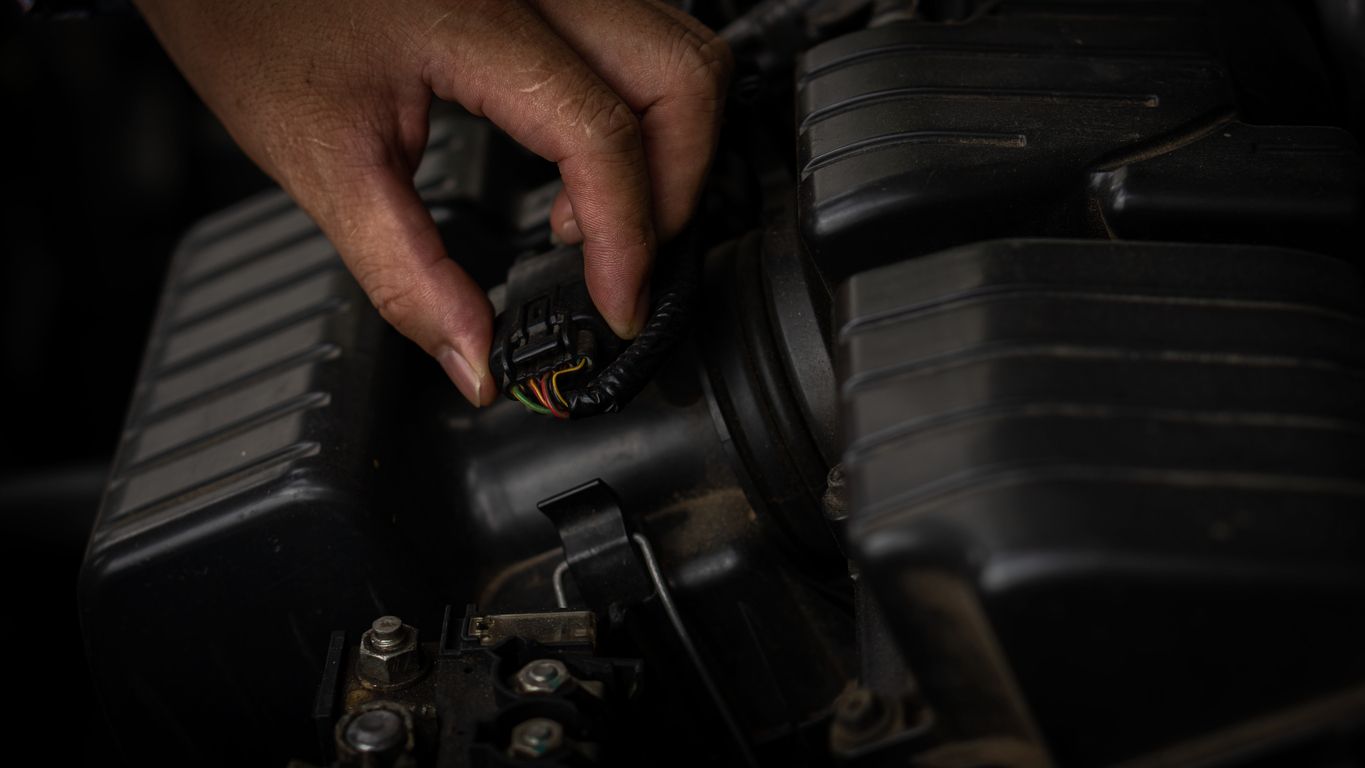If your car is running rough, guzzling more gas than usual, or hesitating at stoplights, your fuel injectors could be to blame. These small but mighty components play a big role in engine performance, and when they get dirty or fail, your entire ride can suffer.
Spotting the signs of dirty fuel injectors and investing in a quick cleaning can help you smooth out your rough ride and get back to carefree cruising. In this guide, we’ll break down the most common symptoms of fuel injector trouble, explain what causes them to fail, and share how you can fix or prevent issues.
What Is a Fuel Injector?
This might be the first time you've heard of fuel injectors, and that's okay. Your car's fuel filter, pump, and injectors are all part of an interconnected (though unseen) under-the-hood system. The filter, pump, and injectors work together to ensure your engine receives the correct mixture of fuel and air.
Here's a general idea of how the whole fuel system works.
- Your car's fuel pump delivers gasoline to the fuel injectors.
- The fuel injectors inject/spray fuel as a fine mist into the intake manifold (or combustion chamber).
- Air and fuel mix within the intake manifold and combustion chamber.
- The air-fuel mixture is compressed in the combustion chamber, and a spark plug ignites the chemical reaction required to power your gasoline engine. (Diesel engines inject diesel similarly but ignite the air-fuel mixture without spark plugs.)
What Causes a Fuel Injector to Go Bad?
Fuel injectors are built to last, but they’re not immune to problems. Here are some of the most common reasons they stop working properly.
- Contamination & Clogging: Dirt, carbon, or poor-quality fuel can clog the injector, reducing fuel flow and causing misfires.
- Electrical Issues: Wiring or solenoid problems can prevent the injector from opening properly, leading to poor engine performance or a check engine light.
- Fuel Injector Damage: If the injector's (metal or plastic) body or connection to the fuel rail is physically cracked (from impact or heat cycling), fuel may seep or spray from it.
- Other Fuel System Failures: A bad fuel pump, pressure regulator, or vacuum leak can affect fuel pressure or delivery, causing the fuel injector to appear malfunctioning.
- Using the Wrong Gas: Contaminated fuel containing water, debris, or even diesel in a gas engine can damage injectors and affect combustion.
Signs of a Bad Fuel Injector
Knowing the complicated process that goes on in your fuel injection system, it's easy to see how bad or dirty fuel injectors can throw a wrench in your engine. But what happens when fuel injectors go bad? Here are some signs to watch for.
1. Your Engine Misfires
Dirty fuel injectors may cause your vehicle's engine to misfire. This problem makes the motor feel like it is sputtering and sending vibrations through the car. Misfires can happen when a fuel injector problem messes with the delicate balance between fuel and air entering the engine.
2. Idling Gets Rough
Does your vehicle shake when you're at a stop sign or sitting in traffic? It's not channeling a bucking bronco. It’s telling you that you may have dirty fuel injectors. "Rough Idling" is typically characterized by varying revolutions per minute (RPMs), even when your foot is off the gas pedal. Sometimes, rough idling is accompanied by engine stalling.
While rough idling and stalling are among the most common dirty fuel injector symptoms, they can also be a sign of other engine problems. If you notice these issues in your car, come in for an engine diagnostic service, which includes a fuel system check. Our professional technicians will investigate the problem and recommend a fuel system cleaning if needed.
3. Your Gas Mileage Drops
Well-performing fuel injectors help your vehicle get the kind of gas mileage that manufacturers promote. While various engine issues can cause you to need to stop by your local gas station more often, lousy gas mileage could signal that something is wrong with your fuel injectors.
4. The RPM Needle Is Erratic
Typically, you control what your car's dash gauges do. When you drive a lot, the gas needle moves from "F" to "E." When you accelerate, the speedometer moves from "0" to "60."
What do dirty fuel injectors do? They can cause the needle on the tachometer — the gauge that displays the vehicle's RPM — to move unpredictably. You may notice the needle moves unprompted, indicating changes in RPM when your car isn't switching gears.
5. Your Car Won’t Start
Fuel injectors deliver gas to the appropriate cylinders. If they fail to do this, your engine won't receive the combination of air and fuel it needs. When the ratio of air and fuel in your engine is off, your motor may not generate the combustion required to operate.
It's rare, but in some cases, fuel injector issues can lead to starving your engine of fuel, which can prevent your car from starting. It's also possible that your car won't start because you forgot to put gas in it. (It happens to all of us!) Unfortunately, running out of gas can also lead to fuel injector issues.
6. The Check Engine Light Is On
If the engine light on your dashboard is flashing or illuminated, it could signal a number of problems — one of them being a dirty fuel injector. When an injector delivers too much or too little fuel, it can lead to reduced engine performance and poor fuel economy.
7. You Spring a Fuel Leak
Fuel injectors withstand a lot, and the heat and moisture can eventually take a toll. A fuel leak could be a sign that there is a crack in the rubber seals or in the fuel injector itself. If you have a fuel leak, make sure to check the condition of your fuel injector.
How to Prevent Fuel Injector Failure
Dirty or bad fuel injectors aren’t a problem anyone wants to deal with. Here are some proactive steps you can take to help protect your injectors and keep your vehicle’s engine running smoothly:
- Drive Your Car Regularly: Long periods of sitting (especially with old fuel) can cause buildup in the injectors. Try to drive your car at least every week or two.
- Avoid Letting Your Tank Run Low: Running on fumes can stir up sediment at the bottom of your fuel tank, which can clog injectors.
- Change Your Fuel Filter as Recommended: Your fuel filter protects the injectors from dirt and debris. Following your manufacturer’s recommended maintenance schedule helps prevent clogs and contamination.
- Use High-Quality Fuel: Stick to reputable gas stations (like a TOP TIER™ Authorized Supplier). Poor-quality or contaminated fuel can leave harmful deposits behind.
- Schedule Fuel System Cleaning: Professional cleaning services help remove buildup, improve fuel flow, and keep injectors performing like they should.
Regular tune-up services can help keep your entire fuel system, including the injectors, in top shape and prevent performance problems down the road.
How to Diagnose a Bad Fuel Injector
Your fuel injection system is complex, and diagnosing a bad injector isn’t always straightforward. Many of the symptoms, like misfires or rough idling, can also point to other engine issues. If your check engine light is on, you can use an OBD-II scanner (if available) to check for some injector-related error codes.
However, the best way to diagnose a bad fuel injector is by taking your vehicle to a professional. Our knowledgeable automotive technicians have the tools and experience needed to find and fix the problem correctly.
If you think your fuel injectors need a little attention, visit your nearest Firestone Complete Auto Care. A Complete Vehicle Inspection can help identify and remedy many issues affecting your ride. Schedule your service appointment online today.



